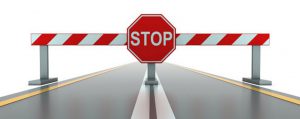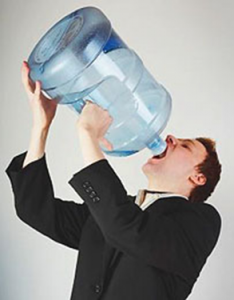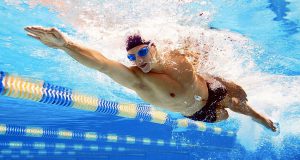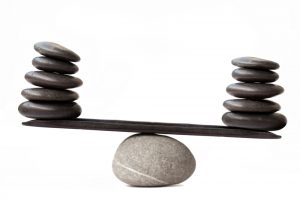
So I know that many of you are athletes, and you probably are concerned all the time about dehydration and understand the causes and effects of dehydration. Well, I want to tell you about the opposite end of the spectrum. I’m going to explain to you my personal experience with the effects of hydration on sports performance, and not just hydration, I mean over-hydration.
MYTH: “There’s No Such Thing As Too Much Water”
This is very, very wrong. I am going to go back to a point in my life where I was in top physical condition for swimming. I was competing at the highest level of master’s swimming and held the title as one of the top breast strokers for my age group in California. This was the peak of my swimming career and this is also when I had serious issues with over-hydrating.
Every day I was dedicated to increasing my performance. This was especially true when I had a break between major meets. I would work out harder both in the pool and the weight room doing everything I could to shave just 0.01 of a second off of my times. I was lifting heavier and swimming faster almost every week, until I hit a road block.

For weeks I battled with myself internally, initially thinking it was a mindset issue. However, after two or three weeks I started to feel pretty fatigued overall, couldn’t drop time, wasn’t energized to get out of bed in the morning (and I typically am a morning person).
After I plateau’d in every stroke, could no longer lift as heavy of weights, and had tried every muscle confusion possibility in the book, I decided I needed to go talk to my doctor. The initial thought was that I had mono, maybe from a drinking fountain at the gym or one of those random places that someone gets Mono.
The doctor ran a few blood tests and I came back negative for any signs of Mono or anything that would be directly contributing to my issues. The doctor asked me about my diet and exercise, I explained to him my level of competition and my workouts. Initially he was under the impression I was just overworked.
I Took A Break

Sometimes rest and recovery is all you need to nurse yourself back to health after a series of strenuous workouts. This is why we see professional or olympic athletes all over the world taper off on their workouts right up until their competitions. This usually generates a ton of energy when your body fully recovers and you operate at peak power. Athlete’s tend to perform their best when they still exercise somewhat, and gradually reduce workouts rather than just cutting themselves off cold turkey.
Here’s are the 6 steps I took to taper off:
- Gradually tapered off of swimming workouts, increased my interval times.
- Pushed back my start time in the mornings by 1 hr.
- Cut back on yardage in the pool. Less yards swam in the same amount of time essentially.
- Swam longer warm-ups and cool downs and adopted less sprint exercises.
- Cut weight lifting down to 3x per week for two weeks.
- Cut the quantity of weight by 25% so I was now only lifting 75% of my normal workout weights.
So after two weeks I should have been back to full health to ramp this back up. However, that was not the case. I wasn’t shocked at this point. Usually after two days or so of tapering I feel twice as energetic and explosive when I hit the water. This time was different.
Back To The Doctor I Went
Being all caught up on sleep, and fully recovered from my strenuous workouts, I knew something was still wrong so I returned to the doctor. The first statement I made to him that day caused just the epiphany I needed. I told him verbatim “I don’t know what is happening here, I eat correctly, take in the appropriate amount of complex carbs and sugars before hard workout days, and I DRINK TONS OF WATER.”
My doctor about fell out of his chair when he realized exactly what was going on. He asked me how much water I was drinking to which I promptly responded,
“Well I fill up a gallon jug in the morning, and I usually drink one of those in the weight room initially,  and then I generally drink another one before lunch, have lunch, drink another half gallon or so, refill before practice in the afternoon, and then I can drink anywhere from 1-3 gallons depending on how intense practice is. I always make sure to have as much as possible before bed as well.”
and then I generally drink another one before lunch, have lunch, drink another half gallon or so, refill before practice in the afternoon, and then I can drink anywhere from 1-3 gallons depending on how intense practice is. I always make sure to have as much as possible before bed as well.”
I’m pretty sure that you are probably thinking I sound crazy and this is obviously not okay, but I was an athlete, I was battling to be the most competitive I could be in the pool, and all I heard from every internet site out there was that you needed to stay hydrated because of all the sweating you do in the water.
This is actually a very common misconception that people don’t fully understand and I am not sure why. Swimmers sweat a ton in the water, especially when the water temperature is a bit higher than usual. What the internet failed to tell me was how much salt and electrolytes I was losing from sweating. Ever wonder why propel, gatorade, orange slices, and all those things are so popular amongst athletes (besides taste of course, fruit punch Gatorade is the business)?
It’s because you need these sugars and salts in order to give your body energy and not over-hydrate your cells.
Have you heard of the new challenges recently where kids are chugging gallons of water really fast and actually causing their cells to drown and DIE? This is a real phenomenon and here’s a direct quote from WebMD to explain it:
“In rare cases, drinking an extreme amount in a short time can be dangerous. It can cause the level of salt, or sodium, in your blood to drop too low. That’s a condition called hyponatremia. It’s very serious, and can be fatal. You may hear it called water intoxication.”
I understand that this says in rare cases, but hyponatremia was a reality for me, and explained my poor performance as an athlete. Granted I did not die, thank goodness, and I am still here today to write about it and explain the effects of over-hydrating.
How I Corrected It
I immediately cut my water intake almost in half. I definitely stayed hydrated, but instead of over consuming water I started alternating in Gatorades and Salted Almonds (my favorite, and the cheapest, are the Kirkland brand).
Within 1 short week I saw a huge improvement in my energy levels. Such a huge weight had been lifted from my mind. The amazing taper I had undergone to combat my fatigue began to pay off and my times in the pool were crushing my previous times. Within two weeks I cut an entire half second off of my 50-breast splits and three seconds off of my 200 breast stroke.
In addition to cutting time and producing personal records, I could suddenly push 5 more lbs in almost every lift. I felt invincible.

Everything, in Moderation
If you read my posts pretty frequently I think you will understand that I am a firm believer in doing everything, in moderation. As much as I believe it’s okay to have some beer, wine, or hell even some whiskey sometimes, you must drink in moderation, I express the importance of that in my article on Working Out and Alcohol.

The same rule applies to water, and everything you do. You must create a realistic balance in your life that allows for you to really pursue your goals. If you are working out 24/7 yeah you may have an amazing body and be in fantastic shape, but the truth is you don’t NEED to be working out this much and you have likely crushed your social life outside of work because of it.
So, pursue your fitness goals, but do so in moderation, drink lots of water, but do so in moderation, take in lots of salts and sugars, but do so in moderation, and finally, eat healthy, but do so in moderation, have some cheesecake on Thanksgiving and don’t feel terrible about it.
You only have one life to live and that’s this one, so while I suggest focusing on remaining healthy to maximize your lifespan, do what makes you happy as well.
If you feel like talking about your personal experience with athletic performance or have experienced hydration issues yourself, please leave a comment below, I would love to hear your stories. If you have experienced a different reaction to over-hydrating please feel free to comment that as well!
